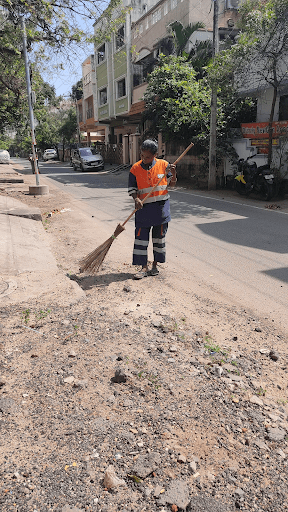Decentralised Micro Composting Centres, garden waste processing units — Greater Chennai Corporation (GCC) has initiated a slew of projects in the past two years, said N Mahesan, Chief Engineer, Solid Waste Department (SWD), GCC. He was speaking at the webinar conducted by Citizen Matters Chennai on managing waste during and post COVID-19. When the trial run for the Bio-CNG plants in Chetpet, which converts kitchen and food waste to energy, is completed, the civic body will inaugurate six more such facilities. “Through these plants, we can process 1500-1800 tonnes of wet waste,” said Mahesan.
In addition to the Material Recovery Facilities (MRF) in each ward of the city, GCC has collaborated with Dalmia Cements for processing dry waste. “The baled plastics are used in cement plants as co-processing fuels. Through this initiative, around 50 tonnes of plastic waste are utilised every week,” he added.
While the panelists and the participants applauded these state-of-the-art projects for processing dry and wet waste, they also pointed out some critical systemic shortcomings. Lack of clarity from the GCC about source segregation and not penalising those who violate the solid waste management rules were unanimously voiced by other panelists.
“The Urbaser (private contractor) leaflet sent out flawed message stating that used sanitary pads and diapers are dry trash, when they should ideally be labelled as hazardous waste. They (the contractors) are so confused, that the segregation system itself falls apart,” said Jayanthi Premchandar, SWM enthusiast and environmentalist.
In response to questions about penalising offenders, N Mahesan said that the solution lies in the approval of the gazette notification to the Solid Waste Management bylaw. “Enforcement measures were delayed due to the pandemic. It will soon be implemented.” he added.
Read more: Here’s how Chennai’s novel Madras Waste Exchange is incentivising recycling
Spotlight on medical waste
Managing waste during COVID-19 has encountered a new challenge: the quantum and kinds of bio-medical waste generated. The biomedical waste issue is not something new. For decades, waste activists have been raising the issue of indiscriminate dumping of such waste alongside the water bodies or peripheral areas of the city; the pandemic has only exacerbated the problem.
Lush farms, open spaces and fresh water lakes in suburban Chennai fell prey to bio-medical waste over the years. “Having teamed up with local groups such as Chitlapakkam Rising, we cleaned many lakes. All water bodies in the suburb we cleaned had bio-medical waste such as syringes and expired medicines. Following the complaints, these wastes would be cleared temporarily, only to be dumped again,” said V Pugalventhan, medical waste activist.
Lack of stringent action from the civic body and local police is the reason behind repeated illegal dumping of bio-medical waste.
Watch the entire discussion here:
Recycling: A viable solution?
The nuances of managing waste cannot be understood without the business of recycling. Is the business of recycling dry waste such as plastics even viable? An organisation Paperman experimented on an app-based model of picking up plastics from the door steps of citizens and selling it to recyclers. “Around 5000 households registered with us in the four years that we worked in the city, and gave us their dry waste. However, it is impossible to sustain the business because plastic is a low-value material and there are no subsidies for such initiatives,” said Mathew Jose, Founder and CEO, Paperman.
Is recycling dry waste a complex process? “Separating the many categories of plastics, the fundamental rule for recycling, is a Herculean task. Recycling as a large-scale activity doesn’t happen in developed countries. Availability of cheap manpower is the only reason why recycling is taking place in India,” said Mathew. The complexity of the procedure only underlines the need to cut down the usage of dry waste and focus on eco-friendly packaging options.
Solutions
From training senior citizens about source segregation to motivating citizens by showing them the videos of waste infrastructure projects, waste warriors had done it all, before COVID-19. But as the pandemic resulted in shutting down of Micro Composting Centres (MCC), and the waste ended up in landfills again, citizens were demotivated to segregate anymore. “To sustain momentum, we organised various drives such as e-waste drive, worn out clothes drive, footwear drive and many more,” said Jayanthi Premchandar. Though many of these proved successful, managing waste as it was done during pre-COVID days will require SWM warriors, GCC and Urbaser to come together.”
Cutting down on the the quantum generated, rather than just managing waste, can hold the key to a real, sustainable solution in the long term. “Decentralising waste by building capacity in ward and zonal levels is also a solution. There can be different approaches in one city,” said Sumana Narayanan, Senior Researcher, Citizen Consumer and Civic Action Group (CAG).
There is enough infrastructure for waste management, said Mahesan adding that citizens should also responsibly follow strict segregation practises.
Tamil Nadu government has been emphasising on source segregation for about a decade now. GCC has also come a long way by setting up infrastructure projects for waste management. However, unless the offenders of waste management are penalised, just like non-helmet users are, it will be difficult to achieve desired, long term results. Also, holding meetings with waste management influencers for feedback will help Chennai Corporation get back on track as far as managing waste in the city is concerned.
